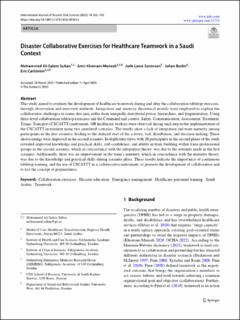| dc.contributor.author | Sultan, Mohammed Ali | |
| dc.contributor.author | Khorram-Manesh, Amir | |
| dc.contributor.author | Sørensen, Jarle Løwe | |
| dc.contributor.author | Berlin, Johan Daniel | |
| dc.contributor.author | Carlström, Eric | |
| dc.date.accessioned | 2024-03-21T10:07:10Z | |
| dc.date.available | 2024-03-21T10:07:10Z | |
| dc.date.created | 2023-04-12T08:28:43Z | |
| dc.date.issued | 2023 | |
| dc.identifier.citation | Sultan, M. A. S., Khorram-Manesh, A., Sørensen, J. L., Berlin, J., & Carlström, E. (2023). Disaster Collaborative Exercises for Healthcare Teamwork in a Saudi Context. International Journal of Disaster Risk Science, 14(2), 183-193. | en_US |
| dc.identifier.issn | 2095-0055 | |
| dc.identifier.uri | https://hdl.handle.net/11250/3123575 | |
| dc.description.abstract | This study aimed to evaluate the development of healthcare teamwork during and after the collaboration tabletop exercises, through observation and interview methods. Integration and maturity theoretical models were employed to explain the collaborative challenges in teams that may suffer from unequally distributed power, hierarchies, and fragmentation. Using three-level collaboration tabletop exercises and the Command and control, Safety, Communication, Assessment, Treatment, Triage, Transport (CSCATTT) instrument, 100 healthcare workers were observed during each step in the implementation of the CSCATTT instrument using two simulated scenarios. The results show a lack of integration and team maturity among participants in the first scenario, leading to the delayed start of the activity, task distribution, and decision making. These shortcomings were improved in the second scenario. In-depth interviews with 20 participants in the second phase of the study revealed improved knowledge and practical skills, self-confidence, and ability in team building within trans-professional groups in the second scenario, which in concordance with the integration theory, was due to the attempts made in the first scenario. Additionally, there was an improvement in the team’s maturity, which in concordance with the maturity theory, was due to the knowledge and practical skills during scenario plays. These results indicate the importance of continuous tabletop training, and the use of CSCATTT as a collaborative instrument, to promote the development of collaboration and to test the concept of preparedness. | en_US |
| dc.language.iso | eng | en_US |
| dc.rights | Navngivelse 4.0 Internasjonal | * |
| dc.rights.uri | http://creativecommons.org/licenses/by/4.0/deed.no | * |
| dc.title | Disaster Collaborative Exercises for Healthcare Teamwork in a Saudi Context | en_US |
| dc.type | Peer reviewed | en_US |
| dc.type | Journal article | en_US |
| dc.description.version | publishedVersion | en_US |
| dc.rights.holder | © The Author(s) 2023. | en_US |
| dc.source.pagenumber | 183-193 | en_US |
| dc.source.volume | 14 | en_US |
| dc.source.journal | International Journal of Disaster Risk Science | en_US |
| dc.source.issue | 2 | en_US |
| dc.identifier.doi | https://doi.org/10.1007/s13753-023-00484-z | |
| dc.identifier.cristin | 2140120 | |
| cristin.ispublished | true | |
| cristin.fulltext | original | |
| cristin.qualitycode | 1 | |

